
Sukarno or Soekarno was an Indonesian statesman, orator, revolutionary, and nationalist who was the first president of Indonesia, serving from 1945 to 1967.
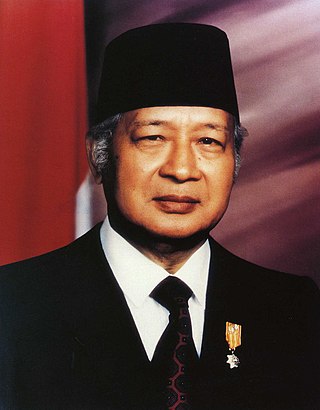
Suharto or Soeharto was an Indonesian army officer and politician, who served as the second and the longest serving president of Indonesia. Widely regarded as a military dictator by international observers, Suharto led Indonesia as an authoritarian regime from the fall of his predecessor Sukarno in 1967 until his own resignation in 1998 following a nationwide unrest. His 32-year dictatorship is considered one of the most brutal and corrupt of the 20th century.

The Communist Party of Indonesia was a communist party in Indonesia that existed from around 1914 to 1966. It was the largest non-ruling communist party in the world before its violent disbandment in 1965. The party had two million members in the 1955 elections, with 16 percent of the national vote and almost 30 percent of the vote in East Java. During most of the period immediately following the Indonesian Independence until the eradication of the PKI in 1965, it was a legal party operating openly in the country.

Adam Malik Batubara was an Indonesian politician, diplomat, and journalist, who served as the 3rd Vice President of Indonesia from 1978 until 1983, under President Suharto. Previously, he served in a number of diplomatic and governmental positions, including Speaker of the People's Consultative Assembly from 1977 to 1978, Speaker of the People's Representative Council from 1977 to 1978, Foreign Minister of Indonesia from 1966 until 1977, and president of the United Nations General Assembly from 1971 until 1972.

The Indonesian National Party was the name used by several nationalist political parties in Indonesia from 1927 until the 2000s. The first PNI was established by future President Sukarno. After independence, the new PNI supplied a number of prime ministers, and participated in the majority of cabinets in the 1950s and 1960s. The party was fused into the Indonesian Democratic Party in 1973. In the years following the reforms of the late 1990s, a number of parties claiming to be the continuation of previous PNIs stood in elections, but gained only a handful of seats.
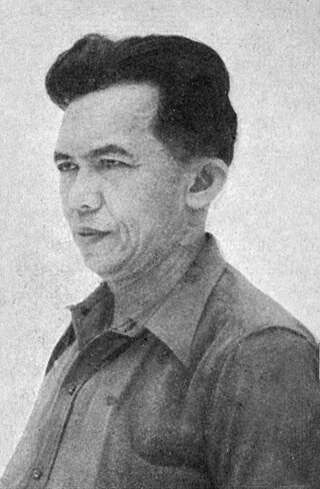
Tan Malaka was an Indonesian teacher, Marxist, philosopher, founder of Struggle Union and Murba Party, independent guerrilla, Indonesian fighter, and national hero. Tempo credited him as "Father of the Republic of Indonesia".

Munawar Musso was a leader of the Communist Party of Indonesia and one of the key figures in the 1948 Madiun affair.

Legislative elections were held in Indonesia on 29 September 1955 to elect the 257 members of the People's Representative Council. The election was the first national election held since the end of the Indonesian National Revolution, and saw over 37 million valid votes cast in over 93 thousand polling locations. The result of the election was inconclusive, as no party was given a clear mandate. The legislature which was elected through the election would eventually be dissolved by President Sukarno in 1959, through Presidential Decree number 150.

The Madiun Affair, known locally as the Communist Party of Indonesia rebellion of 1948, was an armed conflict between the government of the self-proclaimed Republic of Indonesia and the left-wing opposition group Front Demokrasi Rakyat during the Indonesian National Revolution. The conflict began on September 18, 1948, in Madiun, East Java, and ended three months later when most FDR leaders and members were detained and executed by TNI forces.

Sjafruddin Prawiranegara was an Indonesian statesman and economist. He served in various roles during his career, including as head of government in the Emergency Government of the Republic of Indonesia, as Minister of Finance in several cabinets, and as the first Governor of Bank Indonesia. Sjafruddin later became the prime minister of the Revolutionary Government of the Republic of Indonesia, a shadow government set up in opposition to the country's central government.
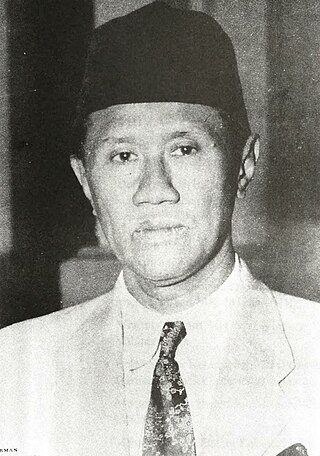
Soekiman Wirjosandjojo was an Indonesian politician and physician who served as prime minister of Indonesia from 1951 until 1952. A member of the Masyumi Party, he also served as the party's first chairman.

The Natsir Cabinet was the first cabinet formed after the dissolution of the United Republic of Indonesia and returned to the Unitary State of the Republic of Indonesia. This cabinet was in charge from 6 September 1950 – 20 March 1951.
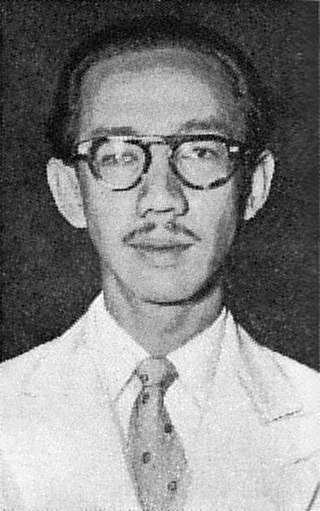
Sumitro Djojohadikusumo was an Indonesian statesman and one of the country's most influential economists. He held senior positions under Presidents Sukarno and Suharto intermittently between 1950 and 1978. During his career in government, Sumitro served as Minister of Industry and Trade, Minister of Finance, and the Minister of Research in five different cabinets. He was also the Dean of the Faculty of Economics at the University of Indonesia.

Wikana was an Indonesian minister and independence leader. He was one of the youths who forced Sukarno and Hatta to declare independence immediately after the surrender of the Japanese. He was the first Indonesian Minister of Youth and Sport. He was a member of the Indonesian Communist Party. Sometime after the 1965 coup d'état attempt, he was arrested and went missing.

Local elections were held in parts of Indonesia in the second half of 1957 to elect provincial and regency and city councils. The Communist Party of Indonesia won a larger share of the vote than it had in the 1955 legislative election, the only major party to do so. The PKI's success, and the declining or stagnant support for other parties, caused concern that the PKI might dominate the planned 1959 national legislative elections, one reason these did not take place.
The Indonesia Party, better known as Partindo, was a nationalist political party in Indonesia that existed before independence and was revived in 1957 as a leftist party.
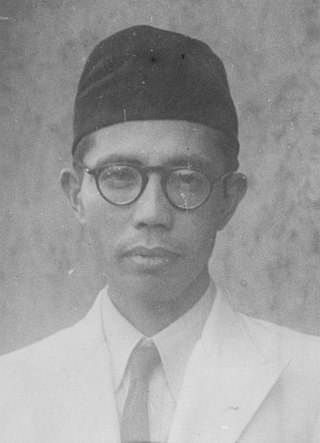
Jusuf Wibisono was an Indonesian politician and economist. A member of the Masyumi Party, he served as Minister of Finance from 1951 until 1952 and again from 1956 until 1957, under the Soekiman and Second Ali Sastroamidjojo cabinets. Originating from Magelang, Wibisono took part in Islamic organizations in the nationalist movement from his school years. He joined Masyumi during the Indonesian National Revolution, and became a leading member within the party despite disagreements with other party leaders such as Mohammad Natsir. In both of his tenures as finance minister, he relaxed the tight budgetary controls of his predecessor, and provided favors to political parties.
Suluh Indonesia was a daily Indonesian language newspaper based in Jakarta which was published between 1953 and 1965. It was strongly affiliated with the Indonesian National Party. The newspaper was one of the largest in the country during the 1950s and occupied first place in terms of circulation during the early 1960s. It was banned from circulation following the 30 September movement in 1965.
Satya Graha was an Indonesian translator and journalist, mostly active during the Sukarno period in the 1950s and the 1960s with the Suluh Indonesia newspaper. Having worked at the newspaper since its founding, he served as its final chief editor before the newspaper's ban and his incarceration in 1965.

Manai Sophiaan was an Indonesian politician, journalist, and diplomat. Originating from South Sulawesi, Manai briefly became a journalist and teacher before joining the Indonesian National Party (PNI). His tenure in parliament saw one of his motions trigger the 17 October affair in 1952. Outside of his political career, he also briefly served as chief editor of the PNI newspaper Suluh Indonesia, and later became Indonesia's ambassador to the Soviet Union until the fall of Sukarno.

















